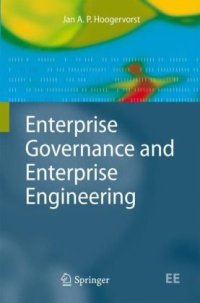
Ebook: Enterprise governance and enterprise engineering
Author: Jan A. P. Hoogervorst (auth.)
- Genre: Technique
- Tags: Business Information Systems, Management of Computing and Information Systems, Organization/Planning, Computer Appl. in Administrative Data Processing
- Series: The Enterprise Engineering Series
- Year: 2009
- Publisher: Springer-Verlag Berlin Heidelberg
- City: New York
- Edition: 1
- Language: English
- pdf
Achieving enterprise success necessitates addressing enterprises in ways that match the complexity and dynamics of the modern enterprise environment. However, since the majority of enterprise strategic initiatives appear to fail – among which those regarding information technology – the currently often practiced approaches to strategy development and implementation seem more an obstacle than an enabler for strategic enterprise success.
Two themes underpin the fundamentally different views outlined in this book. First, the competence-based perspective on governance, whereby employees are viewed as the crucial core for effectively addressing the complex, dynamic and uncertain enterprise reality, as well as for successfully defining and operationalizing strategic choices. Second, enterprise engineering as the formal conceptual framework and methodology for arranging a unified and integrated enterprise design, which is a necessary condition for enterprise success.
Jan Hoogervorst's presentation, which is based on both research and his professional background at Sogeti B.V., aims at professionals in management and consulting as well as students in management science and business information systems.
Achieving enterprise success necessitates addressing enterprises in ways that match the complexity and dynamics of the modern enterprise environment. However, since the majority of enterprise strategic initiatives appear to fail – among which those regarding information technology – the currently often practiced approaches to strategy development and implementation seem more an obstacle than an enabler for strategic enterprise success.
Two themes underpin the fundamentally different views outlined in this book. First, the competence-based perspective on governance, whereby employees are viewed as the crucial core for effectively addressing the complex, dynamic and uncertain enterprise reality, as well as for successfully defining and operationalizing strategic choices. Second, enterprise engineering as the formal conceptual framework and methodology for arranging a unified and integrated enterprise design, which is a necessary condition for enterprise success.